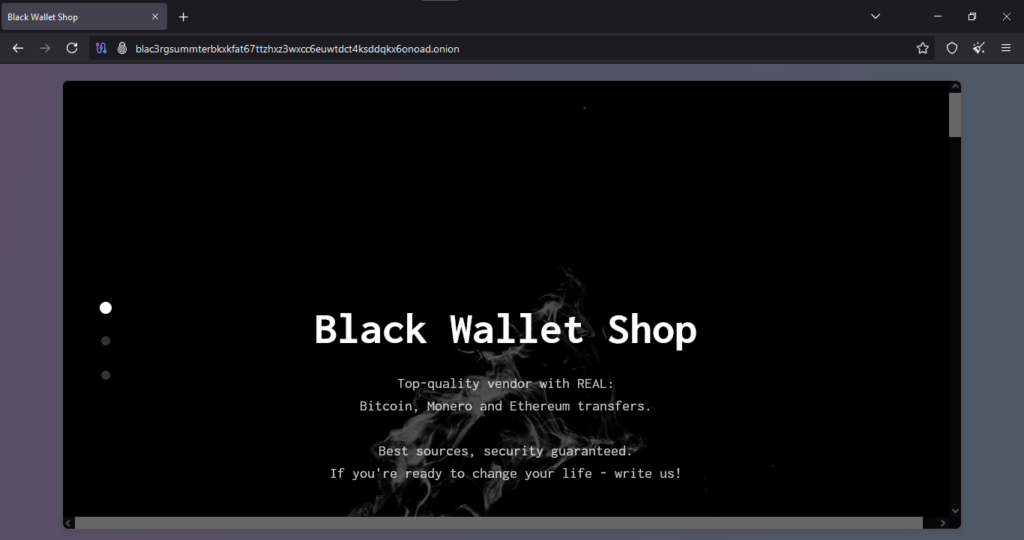Table of Contents
ToggleBlack Wallet Shop – TOR Scam Report (41)
Onion Link : http://blac3rgsummterbkxkfat67ttzhxz3wxcc6euwtdct4ksddqkx6onoad.onion/
Scam Report Date : 2024-12-18
Client Scam Report Breakdown
Original Scam Report :
The report concerns a transaction in which the client purchased a product titled Bitcoin Transfer $1000 for 50.0 USD. The confirmation message stated, “Thanks for your purchase. We will contact you soon.” Despite successfully completing the payment, the client reports receiving neither the promised service nor any follow-up communication. Additionally, attempts to contact the vendor via the platform’s messaging system have gone unanswered. The client’s appeal for assistance, as noted in their statement, reflects their frustration: “As you can see I made the transaction ok but I did not take any money or they do not answer my mails on their page. Please help me do the right thing. Thank you in advance.” This report highlights the unfulfilled promises and lack of support, which are hallmark characteristics of fraudulent transactions.
Terminology and Concepts Defined
- Bitcoin Transfer: This term refers to the transfer of cryptocurrency, in this case, Bitcoin, as part of a purchase. Bitcoin transactions are decentralized, irreversible, and recorded on a blockchain, which can make recovering lost funds due to scams particularly challenging. The advertised $1000 transfer in this report appears to have been misrepresented, as the client neither received the promised amount nor a resolution to their grievance.
- Confirmation Message: The seller provided a generic acknowledgment of the purchase, stating they would contact the buyer soon. Such messages often aim to establish a sense of legitimacy and temporarily appease the buyer. However, in scam operations, this step is rarely followed by genuine communication or delivery.
- Unanswered Emails: The client mentions their attempts to reach out through the platform’s support channels. A lack of response is a significant red flag in online transactions, signaling either negligence or intentional avoidance by the seller. Scammers often rely on the anonymity and lack of accountability inherent in some online platforms to evade responsibility.
The use of Bitcoin in this context compounds the issue, as it offers no chargeback or dispute mechanism that a buyer might leverage in cases of fraud. This highlights the importance of verifying the legitimacy of sellers before engaging in cryptocurrency transactions.
Implications and Recommendations
This report underscores the inherent risks of engaging with sellers on platforms that lack robust oversight and accountability mechanisms. The client’s loss illustrates the vulnerabilities buyers face when transacting with unverified vendors, particularly when using cryptocurrencies like Bitcoin. Such payment methods, while secure and efficient under normal circumstances, are also favored by scammers due to their irreversible nature.
To avoid similar scams, clients are encouraged to thoroughly research vendors and platforms before making purchases. Key precautions include checking reviews, verifying the platform’s dispute resolution policies, and initiating small test transactions to evaluate reliability. Additionally, buyers should be wary of overly generic confirmation messages that provide no concrete timeline or method of contact.
For affected individuals, compiling detailed evidence—such as screenshots of transactions, communication logs, and product descriptions—can be critical in seeking recourse. Although recovering funds from cryptocurrency scams is often unlikely, reports like this can help authorities track patterns of fraudulent behavior and prevent others from falling victim to similar schemes. Platforms facilitating such transactions should also be held accountable, as their lack of response and oversight contributes to a harmful environment for users. By raising awareness and adopting cautious practices, users can better protect themselves in future dealings.






